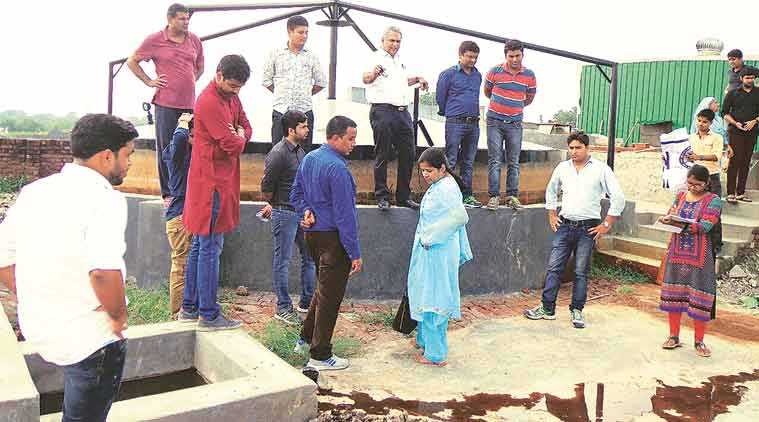Stay updated with the latest - Click here to follow us on Instagram
Change agents: A village in Delhi finds a way to escape the smell of cowdung
Plant set up by Delhi University professor processes dung into biogas and manure; air cleaner, canal leading to Yamuna river spared dumping.
 The plant, which was set up with technical help from IIT Delhi. (Express Photo: Shradha Chettri)
The plant, which was set up with technical help from IIT Delhi. (Express Photo: Shradha Chettri)
Harkishan Lal owns a dairy in Mukhmelpur village in north Delhi, where he rears about a dozen cows and buffaloes. He has been running it for almost three years now, from a rented area. Until last year, he would dump the dung into a canal in front of his dairy, feeling guilty about it, because the canal eventually flows into the Yamuna.
“I knew I was not doing the right thing, but I had no option. It is a rented place, and I don’t have the extra space to dump the dung,” said Harkishan Lal, who hails from a village in Bihar.
Since October 2016, however, Lal has no longer had to feel guilty about polluting the canal and ultimately the Yamuna. This has been thanks to a small biogas plant near his diary, started by a Delhi University professor. The dung is now collected every day for the plant, which produces biogas and bio-manure.
The initiative by Professor Tejbir Singh Rana, who teaches geography at DU’s Shivaji College, was the result of a suggestion from his daughter, Anandita, now a Class XII student in Delhi Public School, Rohini. The Ranas live in Mukhmelpur and Anandita felt that starting a biogas plant would help rid the village of the smell of dung. The small plant has been welcomed by other villagers too.
“Pehle yeh gobar yehi pari rehti thi aur bahut badbu atah tha (earlier, the dung used to lie here and smell),” said Raghubir Khatri. “Now it gets cleared every morning, the smell is gone and there are no mosquitoes and other insects in the village.”
Set up with technical support from IIT Delhi, the biogas plant stands on a plot of farmland about a furlong from the nearest households of the village. It spans 400 square yards.
“The plant processes 500 kg of cow and buffalo dung daily, collected from the village and the diary. It produces 20-22 kg of methane a day,” said Rana, who made an initial investment of Rs 12 lakh from his own pocket.
The gas is utilised for cooking midday meals for municipal and Delhi government schools in the area, he said; a small kitchen is located near the plant itself. And whenever there is any religious or cultural function in the village, the kitchen is opened to the public so that they can cook enough food for a feast.
“Besides that, the biogas plant has also helped checked methane emission and in a small way saves the village environment from being polluted. As is known, methane is harmful for the ozone layer. There is also byproduct in the form of bio-manure, which is highly nutritious for the soil for organic farming. This has helped reduce our dependency on chemical fertilisers,” Rana said.
Farmers from nearby villagers have been coming and buying the bio-manure, he said. “With this bio-manure, we are now also planning to start growing organic crops, which are more healthy and nutritious,” said Rana, whose family has members who still depend on agriculture.
Earlier, Rana has installed 200 solar panels of 50kW in his house at Budhpur on G T Karnal Road. Since October 2015, when it was set up, the plant has generated 1,45,000 units of electricity, which is supplied to a local discom.
“This has helped prevent more than 95 tonnes carbon from being pumped into the atmosphere. It is a small way to contribute to saving the environment,” said Rana.







